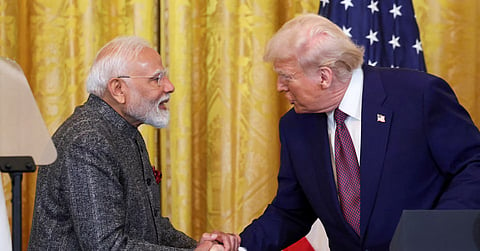
- Home
- Live Blog
- Breaking News
- Top Headlines
- Cities
- NE News
- Sentinel Media
- Sports
- Education
- Jobs

NEW DELHI: When United States President Donald Trump imposed a 25 percent “reciprocal tariff” on India, many thought New Delhi would bend over backwards; and when he added another 25 percent as punitive measure against buying Russian oil, they thought cargo ships from Moscow will be stopped immediately. Instead, New Delhi pursued measured negotiations, keeping dialogue channels open while sending strong signals on India’s readiness to defend its economic interests. President Trump has lately been sending positive signals about strengthening ties with India. And now, India and the United States are on the verge of finalising the first phase of a bilateral trade agreement (BTA), which is expected to resolve tariff disputes and expand market access. Bilateral talks between India and the US have reached an advanced stage, with officials confirming that the first tranche of the BTA is “nearing closure”. This phase primarily addresses the 50 percent tariffs imposed by the US on Indian goods. Meanwhile, India’s Commerce Minister Piyush Goyal emphasised that any agreement must be fair, equitable, and balanced, protecting sensitive domestic sectors such as farmers and fishermen. The talks can be divided into two parts; one focussing on reciprocal tariffs, and another on broader market access and regulatory issues. The tariff package is expected to be finalised sooner, while the second part may take some time. The first phase of the BTA may see some easing in the 50 percent tariff burden, making Indian exports more competitive. Sectors like pharmaceuticals, textiles, and engineering goods, already driving over $50 billion in exports to the US in 2025, stand to gain further. For India, the deal could bring significant benefits in terms of reduced trade barriers, stronger export opportunities, and deeper strategic alignment with Washington. Thus, government of India’s political will, resilience and some deft political manoeuvring ensured that the Indo-US trade talks, once mired in tariff disputes and geopolitical frictions, move toward a balanced and positive outcome. The government ensured officials emphasise the broader Indo-US partnership, including defence, technology, energy, among others, to ensure that trade talks were framed not merely as transactional but as part of a strategic alignment. It has repeatedly stressed that any deal must be fair, equitable, and balanced, with safeguards for farmers, fishermen, and small manufacturers. This resilience reassured domestic constituencies while strengthening India’s bargaining position. (IANS)
Also Read: Donald Trump drops tariffs on food imports; India’s mango, tea exports may benefit